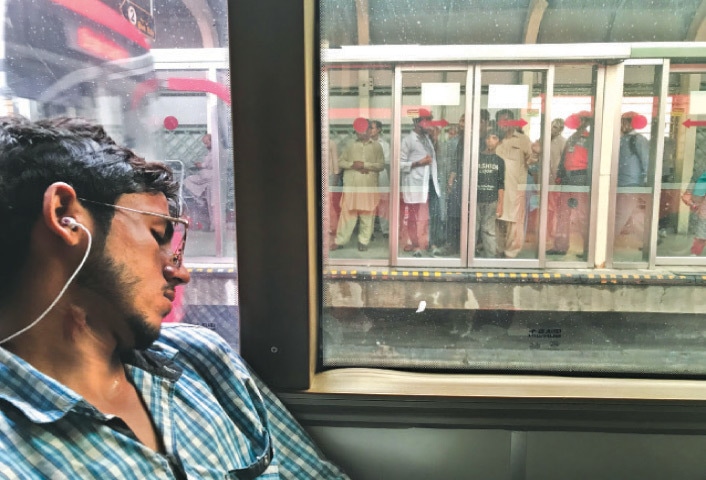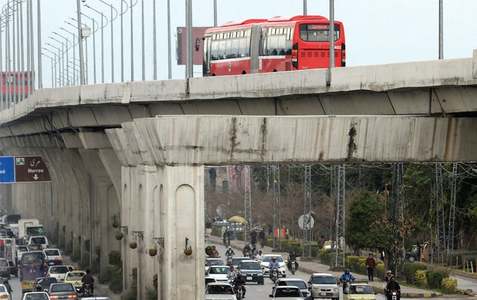
“Though Lahore fascinated me as a big city, more than that I saw people from all over Pakistan here, making it an inclusive city that absorbs all kinds of people: strugglers, students, labourers etc. People usually look at Lahore as a historical city, but I wanted to listen to and document the stories of its inhabitants. Lahore gives hope, opportunity,” is how Faizan Ahmad described the Punjab capital while speaking about his yet-to-be-published book.
Launched on the crowdfunding platform Kickstarter on Friday, Lahore by Metro features 244 of around 10,000 stories and struggles of common, everyday people that Ahmad documented through his humble mobile phone while travelling by the Metro bus daily to and from his college since moving to Lahore in 2013 from the remote town of Basirpur for higher education. He now works as a researcher at a university along with writing for various local and international newspapers.
Since moving here, most of Ahmad’s time was spent at the Metro station where he would run into all kinds of people. “Travelling by bus really fascinated me and for a week I only observed my fellow passengers. It made me realise that different kinds of people from different cities and backgrounds were travelling together in a bus, which gave me the idea of documenting their stories along with their portraits. Of course, not everyone was open to sharing their lives with a stranger, but some were totally uninhibited and spoke straight from their hearts after I broke the ice in the language they were most comfortable in — Punjabi. I want readers to experience Lahore through its common people, in their own words.”
And when Ahmad talks about the diversity and inclusivity that the Metro bus rides revealed to him in the city, he illustrates them through the stories of a man who spent 10 years in jail, a woman sharing the happiest day of her life when she completed her MPhil, first-time visitors to Lahore, an old couple travelling by the bus just to tour the city, British-Pakistani labourers, a woman working at a bus station sobbing out the harassment she faced by her supervisors, young boys only hopping on the bus to sleep in the air conditioner, and many more.
“Every station has a different story depending on its area. Youhanabad has a huge Christian population and the locals decorate the station there every Christmas like they decorate their homes. Then you encounter elderly people at the Data Darbar station, tourists at the Badshahi Mosque one, and my most favourite: the Gajju Mata and Shahdara where women are sitting on the station floor, waiting, just enjoying life.”
The young photographer/author says he often missed his college bus station while talking to a passenger because of the interesting, exciting, emotional stories he was listening to. Surprised and awe-struck by their honesty and clarity, these conversations turned from chats to good incidents to, eventually, powerful, hopeful stories.
“I loved the story of a 50-year-old man who cried while telling me that the happiest day of his life was meeting his father five years ago. His father had gone to Saudi Arabia for work when the man was a child and since then couldn’t visit as he could not save a penny.
“Then I was fascinated by the love story of a rickshaw driver who used to write letters to a girl who turned out to be Christian, how they both fought to make their relationship a reality and the many forced conversion cases on him. He said now it felt like a dream that she was his wife and the mother to his children. He even showed me her picture in his wallet. Then another favourite story is of an elderly woman who kept patting her husband’s shoulder, asking: ‘Tu thakk te nai gya? Neend te nai aa rahi? Data sahab aan aala ay.’ They had only come to Lahore to visit the shrine.”
Then he says the last story in the book is about a woman working at the Metro bus in the evening and as a domestic help during the day for her children after her husband divorced her and she moved to Lahore from their village.
“She said she was happy that her children were now studying, which wouldn’t have been possible back in the village — her daughter was in Grade 10 and a son in second year of college. That gave me hope. I would later see her at the station every day and she would wave at me,” Ahmad concluded.
Published in Dawn, January 23rd, 2021













































